Bilal, the Outrunner (Part-4)
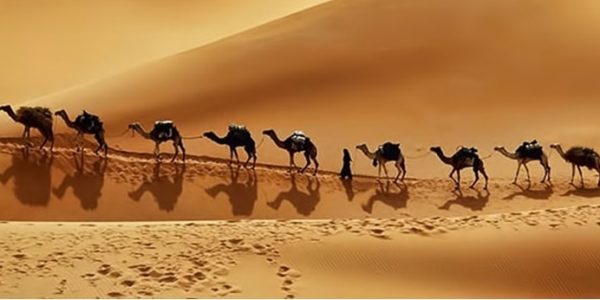
Beginning with the previous three issues of Young Muslim Digest, the life of Bilal bin Rawaha, the famous Companion of the Prophet, is being serialized in this column every month. Presented herein under is the fourth installment in this series taken from the brief, but significant, biography by SYED IQBAL ZAHEER.
You and Him
First and foremost, of course, he would have learnt that you have to worship God many times over every day. It is to set right your relationship with Him: He, the Master and you, the slave; He, the Provider, you, the needy; He, the Creator, to whom you, the created, shall return.
This you had to remind yourself many times over, every day, through the Prayers, because there are so many in the world who aspire to become gods themselves: through tyranny, oppression or, if that doesn’t suit the situation, through intelligent guile. You need to dislodge them and re‑install God through the Prayers.
Some of these small gods work directly, shamelessly, arrogantly. Others are clever. They assert their authority with a smile, with cunning, with diplomacy. Yet others there are that persuade you through smart reasoning. They would almost have you believe that they are better than you, more intelligent and knowledgeable.
Hence, you must accept and follow them in their suggestions, advice and the authority concealed in “I think this is the best thing for you in this situation,” kind of sentences. They will legislate and you will act. They will make the schematic drawings and you will construct … your life … build your dreams that will never come true. They will make the rules and you will throw the dice in the “heads you lose, tails they win” setup.
Now, if you don’t turn to God often and seek your freedom by declaring that you are no one else’s slave but His – if you don’t do that, you’ll end up their slave: no matter what status you occupy in their society. Every person who does not know his God ends up a slave of others. Worse. He ends up a slave of many.
Even the ruler is a slave of his subjects, trying to take advantage of them, but also following their wishes, knowing that if he didn’t please them enough, they would kill him. When he makes the ceremonial bow before his subjects it is symbolic of his submission to them. It is the acknowledgement of the ‘give and take’ deal struck between them … behind the scenes.
When a man bends forward for a scholar, sheikh or thinker, and thinks it unthinkable to question what he hears from him, then he has sold his freedom, lost his true Lord, and is stuck in the mud for the rest of his life. He will never be a better person, a different person, a free person.
Again, Bilal would have learnt from experience that frequent visits to God’s Presence gives life the 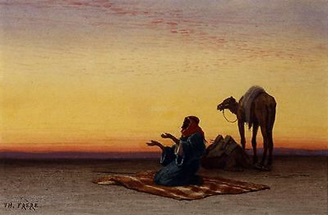 spiritual dimension that lends meaning to the physical existence: as like the time dimension in space without which matter would drift in space endlessly.
spiritual dimension that lends meaning to the physical existence: as like the time dimension in space without which matter would drift in space endlessly.
Prayers lift you off the dreary, physical, humdrum of material existence and usher you into the realms where your soul dances the ecstatic dance of freedom, with you quite consciously ‘feeling’ its existence besides yourself. You could almost hold it in your hands in those situations; and, at such moments you feel that this is the ‘real you’ and that the body is only a container, a carrier. You are the soul, the soul is you.
That feeling of your existence besides your physical self, that ‘something’ that no one else can have access to, and whose privacy no one can disturb, in the moments of intensive concentration in Prayers, gives the terms ‘freedom’ and ‘liberty’ a new meaning and your drift, a sure direction.
A fresh experience every time, Bilal would have realized, Prayer is a break from the monotony of life. Each time you apply yourself with renewed vigor, you cross into new frontiers, glide into new spheres of joy, and into new planes of self‑confidence. Every time you did that, you came out a different man, an experienced man, a serene man, ready once again to go through the tasks of life without the fear of tomorrow, without the regret for yesterday.
With the morning Prayers done just when the night yawns and the stars begin to retire, life must have smiled anew for Bilal each day, as would have smiled the dawn looking down upon earth, ready to spread radiance on the hill tops. The morning breeze floated a new freshness, as if straight from the heaven, the flowers opened up their bosom for the seekers of sweet joy and pumped out waves of fragrance that served as the soul’s nourishment. The blades of grass swung deep to the left and right – as one drunk in love – and the birds uncontrollably broke out into the morning song in a chorus, with such spontaneous gaiety that it sounded spasmodic.
Then it is, that, coming back from the mosque, you feel you are more a part of the uplifting, enchanting, exhilarating world than that of the life of hoe and hammer. You feel you are homogenized … synchronized … with the nature of things … with the world at large, and with the human caravan that is now ready to head for the redefinition of words, reshaping of lives, and renovation of the world.
It would have been so refreshing to Bilal.
Prayers also provide the occasion to demonstrate, to yourself, first and foremost, and to the community as well, that you really believe in God and belong to them – the community of believers. For, so many people say “We believe,” but they don’t! Even if their word is taken at face value, the God they believe in is not their personal God. It is someone up in the heavens, about whom their parents always told them, or they always thought it out, as to how great He is. But they never met Him, never felt Him personally.
For them He remained more of an ‘It’ and hence of an abstract existence, and not real. To them, He is not someone who can melt the hearts, and bring tears to the eyes: the tears that can wash off worries, and leave behind a soul at peace with the world. Rather, for them, He is someone who is in sympathy with the godly and the pious on earth, alright, but is unable to interfere, incapable of aid, and incapacitated to change the course of things. The utmost they imagine He can do, is to reward them when they go back to Him – if they’ll go back to Him. “But, who knows?” at times they wonder.
In contrast, the God of Islam is the personal God. You are closely bound to Him. When you are in trouble, you ask Him. And you get it. Hence the frequent Prayers which is a means of communication with Him and an expression of love and gratitude to Him. And directly … with no intermediary in between. You and Him. Him and you.
 That’s what Bilal would have learnt from the revelations about the meaning of the Prayers. Your soul is not alone. There’s company when there’s no company!
That’s what Bilal would have learnt from the revelations about the meaning of the Prayers. Your soul is not alone. There’s company when there’s no company!
The Mainstream
Bilal must have also learnt from the revelations that he didn’t exist in a vacuum. He belonged to a monolithic body of humanity via the society of Islam he lived in as the immediate though smaller, unit. He belonged to the society of men and women around him, and they belonged to him. He belonged to it and to them, no matter how the society itself or its members looked at him or treated him. He was one of the society, whether it gave him a high chair or a low stool, whether it accepted him or cast him out – he remained its integral part, bound to it and intricately related to each member of it, no matter how distantly. He belonged to it and the others belonged to him.
All – the believers and the unbelievers, the blacks and the browns, the city‑dwellers and the bedouin, the proud and the humble – were equal creations of God, all of whom received equal attention from Him. They all had to do their short sojourn on this earth and pass through the same tests. Each had his rights and each his duties. And, so long as there was no opposition to working together on certain common grounds, he belonged to the society at large. He did not belong to it in its evil attempts. But as long as there was constructive activity, he belonged to them, was one of them.
In addition, Bilal would have realized that being a Muslim meant a life of responsibility. There were rights and duties upon each believer, not in accordance with where the society placed him, rather in accordance with where Allah (swt) placed him. One could take, if he had to. Or maybe he could do without it. But he had to give. And give a lot. For the world will be built by those who will give and not by those who will take.
He must have learnt, also, that even his own Makkan society was not an independent piece unhinged of the past and the future. It was a flowing thing that had its origin, the spring, the main river, branches and canals and even ponds. So wherever you were, as a drop of water, you were part of a big whole. If you were not a part of it, then as a drop of water you evaporated. You are part and parcel of the humanity that did not start off in this generation, and which will not end up with this generation.
He must have also learnt that while you remained an integral part of humanity in general, unless the others broke away from you, you also, as a Muslim, particularly belonged to another prominent body of people that had in every age accepted the Messages of God, sent from time to time.
Those who accepted those messages, became an integral part of the society of Muslims. That was the mainstream. Those that did not, were cut off from the river and were placed on earth in the form of ponds and lakes. If they swelled in faith, righteousness and piety, they joined up with the main stream. If they refused, they shrank and dried up to non‑existence … to oblivion. Hence, Bilal would have known that if the Makkan society accepted the new Message, it would remain in the family of God. But if it refused, it would be cut off from the mainstream and will eventually dry up.
The Phoenicians, the Canaanites, the Assyrians, the Babylonians, the Pharaohs, the Aadites, the Midyanites, the Chinese, the Greeks, the Persians and the Romans … and … much before them … the people of Noah … and countless others … the map of the world does not show the dried up ponds or lakes … all destroyed themselves this way. So it has been in the past, to which we belong, and so it will be in future, which belongs to us.
If the people of the coming ages accept to be part of us, they will continue to live. If they refuse, they’ll perish … naturally … no matter how big the rejecting unit, even if like the sea, … they’ll perish all the same … in time … as does the single head of cattle separated from its herd perishes in the forest. Many large and small communities have died before, and will die in the future.
The main unit, the mainstream, is constituted of those individuals and communities that accept the messages of God. They are the ones that will survive, until the end of the world, for they are the fittest. History will revolve around them.
These were some things that Bilal would have learnt from the Qur’an.
So Bilal would have learnt that apart from the general body of humanity, he also belonged to the main 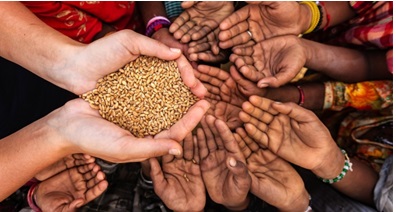 stream of believers flowing down since ages. He belonged to them in a special way. And this bi‑polar belonging imposed some duties, as it granted him some privileges. One such duty, he must have learnt, was to spend. Of whatever little that he had, he had to spend on those who did not have that little: and always there were some ‑ near or far, that were worse off. If you had a nickel left stuck in the depth of your pocket, there was someone who couldn’t boast of that. So the need to give remained.
stream of believers flowing down since ages. He belonged to them in a special way. And this bi‑polar belonging imposed some duties, as it granted him some privileges. One such duty, he must have learnt, was to spend. Of whatever little that he had, he had to spend on those who did not have that little: and always there were some ‑ near or far, that were worse off. If you had a nickel left stuck in the depth of your pocket, there was someone who couldn’t boast of that. So the need to give remained.
There were the neglected widows, the uncared‑for orphans, the exploited wayfarers, the poor, the downtrodden, those in prison, and, O yes, slaves, like himself. They all needed redemption. And giving created the conditions of redemption as it also redeemed your own soul.
Such would have been the things that Bilal would have learnt.
This Book, the Qur’an, they said was poetic. Well, poetic or not, it certainly would have sounded revolutionary to Bilal. It was altering Bilal’s way of thinking in a manner it had never occurred to him it would. At times he must have felt drunk.
Discovered
Surely people around him would have begun to suspect changes in him: his attitudes, habits and even his contour – there was that glow that could not be mistaken for anything else. But one can’t be sure what’s happening inside a man. Therefore, they would have let things pass in the beginning. But somehow his master discovered the cause of the change: it was his acceptance of Islam.
His master must have felt snake‑bit. He enquired in a stern voice, packed with warnings: “Have you given up the religion of your forefathers, Bilal?”
For Bilal this was an ironic question.
A cruel one too.
Religion of the forefathers. Huh!
What was there in the religion of the forefathers? Worshipping idols made of clay? Falling down before what you molded with your own hands? Is that what you call duty to God?
This was the question that `Umayr had asked Safwan ten years later. `Umayr and Safwan were childhood pals. When the call of Islam spread, `Umayr accepted it. Safwan was upset and swore that he would never speak to `Umayr again. That was painful to `Umayr. He pleaded with him: “Safwan! You are a leader of the people. Consider man: We were on the religion of stones, worshipping them and slaughtering animals for them. Is that what you call religion?” Safwan didn’t have an answer.
Then, after this duty that supposedly satisfied the supposed gods, you were free to live the way you liked: the rich suppressing the poor, the strong crushing the weak and the wicked trampling the innocent. And rights? Well you don’t ever talk of giving rights. It’s only your rights that you watch with the eagle’s eye. Further, you don’t ask your own rights. You just take them … with brute force. And, when all has been settled with either the sword or subtle cunning, you revert to the standard norms of goodness: “How beautiful and expensive is the beast you ride, how large the pack of your cattle, what wine you can afford to offer your friends, and how much can you spend on the poor in order to earn the title: ‘generous!’”
If that is all that the religion of the forefathers demanded and gave in return for submission to it, then, better be done away with it – Bilal must have said to himself. But could he say these things to his master. Would the man’s course mind appreciate a proper answer?
Therefore, all that Bilal could say in reply was a simple, “Yes, I have.”
But this is not a reply an unbeliever will appreciate. Tell him you believe in a thousand gods, and he has no objection to it. Tell him you believe in three and a half gods, and you are still even with him. Tell him you don’t believe in ‘no any god,’ yet he has no problems with you. “That’s your business,” he’d say. But tell him you believe in One God, and that of Islam, and suddenly he is alarmed. He hates to hear those words. He begins to have nightmares. Now it is his business as to what you believe in and what you don’t believe in. He begins to suspect that somehow you are linked up with a mysterious Power, (acknowledging the God he denies!), will free yourself of all shackl es and will somehow end up taking over the government of the world.
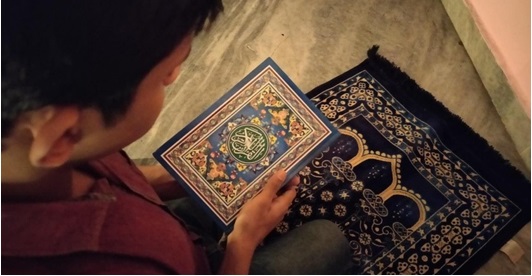
When Moses presented his message of worship and obedience to One God, the reply of Pharaoh was:
“The two are magicians who aspire to expel you from your land with the help of their magic!” (20: 63)
What does worship and obedience of One God has to do with the expulsion of the rulers of a land might be an enigma to the believers, but it is a foreseeable reality to the unbelievers. From thereon, insomnia is safely perched up on their eyes.
So when his master got to know of it – and surely it was big news to him – then no wonder he might have shouted out threateningly: “You’ll have to come back to your old religion, Bilal.”
Little did the man know that Bilal was no more the run‑of‑the‑mill of yesterday. He was a different person now. Belief in one God and the readings in the Qur’an had given him a character….a personality. He had undergone a sea of change. He wasn’t a robot anymore, programmed to behave like the rut. He was getting original!
Islam frees a person and allows his personality to grow to its full potential. That makes a new person of every person, whatever his past: one who is as human as others, as much with a nose, lips and eyes as others, as much praying, trading and interacting with others as anyone else. Yet with a difference. He is 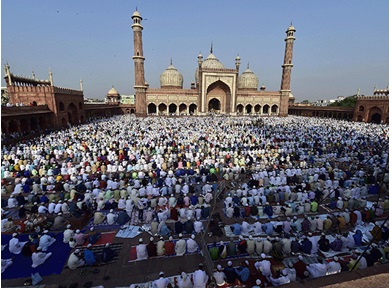 not that carbon‑copy that other societies make of their individuals. Muslim society is a colorful society.
not that carbon‑copy that other societies make of their individuals. Muslim society is a colorful society.
While Islam binds the soul to the eternal, the heavenly and the natural, it liberates the mind of the individual giving it total freedom. So that the individual borrows for his, or her, self the variety of the eternal, the heavenly, the natural.
Bilal told the man he was not going to abandon the new religion. “Was there any good reason he should?”
The man could have had no reply. He would have been angry … very angry. He might have told Bilal, in his words: “You gonna come back to the ol’ religion, Bilal, or you gonna have plenty of trouble with me. And you better get that straight down your head sooner than I go for some action, man. I ain’t sitting here idle watchin’ you bump your head against the earth tha’ way lad!”
Some Problems
Yes. Problems there were for Bilal.
In the beginning they tried to persuade him – with words. They told him he would soon go crazy. Muhammad himself, they were pretty sure, was under the spell of a jinn and the same jinn would drive Bilal mad too. In fact, he could already be under a spell. Did he need some treatment?
Or, it could be that Muhammad was himself a skilled magician, so he better be careful. Nothing else could explain such a great change of mind. A thousand gods, all performing their separate functions so beautifully, replaced by just one? Com’on man, you must be kidding. Ain’t that ridiculous?!
Such could have been the arguments.
If today’s professors of religion and philosophy can defend idol‑worship before twentieth‑century students in university halls, surely Banu Jumah, the very fountain‑heads of those ideas which the later generations would refer to as the “wisdom of the east,” couldn’t have been short of proofs and arguments.
In reply to their arguments, therefore, Bilal could have only smiled … inwardly … and ignored them. So they grew persistent, and, with time, and obduracy on the part of Bilal, harsher. Yet Bilal would not budge. Finally, they threatened him with physical violence and put their promises to action when they realized that words had failed to convince Bilal how nasty the civilized ones could turn when offended.
As a preamble they might have begun to deny him food. But there could be a problem in that. They would have had to get work done out of him. If he starved he wouldn’t put out sufficient work. So they would have had to go for strategies that would not cause him much physical harm but break his will. They began to misbehave with him in a variety of ways and even beat him up. But Bilal stayed firm. There was no denying Muhammad, no worshipping the historical deities and no accepting the “wisdom of the ancients.”
After some initial failures at convincing Bilal how great the religion of the idols was, and how entirely reasonable it was to believe in multiple gods, the matter was taken beyond the residential quarters of the clan. They began to insult him in public. They would take him out, fill his head with dust and pebbles, clad him in a piece of leather, and drag him through the Makkan valleys and ravines. But ‘ahad, ahad (One God, One God)’ were the only words Bilal would say – if he felt he had to say something at all.
It was not for the dignity of Bilal to be replying to all that he would hear. But they weren’t going to spare him either. After all, Arab chivalry hadn’t prevented them from torturing Muslim women. Umm `Abees, Zanneerah, Sumaiyyah, Al‑Nahdiya and her daughter, were some that did not beg the mercy of their powerful masters when tortured.
Khatam an‑Nabiyy‑yin
After the failure of the milder methods they caught on intensity. On one occasion they led him, Khabbab, Suhayb, `Ammar and `Ammar’s mother Sumaiyyah, to the outskirts of the town. They made them wear steel coats‑of‑mail and ordered them sit in the sun. With those steel shirts on, they would have, within a minute, felt being roasted. In Arabia a thermometer placed on a piece of metal exposed directly to the sun can read about 120 degrees centigrade on a hot summer day. Severe thirst, dehydration and loss of salt due to massive sweating would have taught them that misery can have many facets. One shudders to think what they would have felt like after about quarter of an hour.
It was on one such occasion that Abu Jahl – another pillar of the pre‑Islamic Arab society, whose birthday was recently celebrated by the remnant guardians of the ‘wisdom of the east’ in India – turned up, began to say foul things to his slave‑woman Sumaiyyah, and, finally, in a fit of rage, threw his short spear powerfully at her. It hit her in the vagina and she died on the spot. She was the first martyr in Islam. (Ibn Sa`d)
Everyone of them – watching the ghastly scene of the lady, clutching the spear, slowly giving up her soul – would have felt terribly grieved and miserable. Her youthful son, `Ammar, would have especially gone through some very agonizing moments. How much would he have longed for revenge? The sight of her mother, hit in the vagina, dying before his eyes, while the crowd watched, in a hushed silence, couldn’t have been an easy thing for him to scratch from his memory the rest of his life.
One wonders how these people kept their tempers in control when they entered Makkah triumphant a decade later. But there wasn’t a thing he, `Ammar, could do, they could do, or any Muslim could do.
Nevertheless, after some tine, this method of torture – steel shirts and exposure to the sun – broke the will of these people. They began to suffer blackouts. They were ready to say what the pagans would order them say. They would ask them if Lat and `Uzza (chief deities of the Arabs) were not their gods, and they would say yes. They would ask them if they denied Muhammad, and they would say yes. It is said that they were in such delirium that when their torturers pointed to a passing mule and asked them if that wasn’t their Lord, they said it was! Or, maybe, the Makkans weren’t too sure of their own list of gods.
When released they lay there in lumps unable to move. Their masters carried them off on leather sheets much like they would carry a slaughtered lamb. (IbnSa`d)
Save for Bilal. He didn’t say a word that would please them! And he did not faint.
(To be continued)

